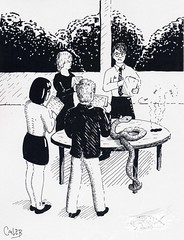One of our esteemed science teachers at the high school has a pet in his class room. It is a huge snake. It is a python named Monty, of course. I suppose Monty must be around twelve to fifteen feet long and he is big through the middle, at least six inches wide. That means he would wear a belt about a foot and a half long.
Years ago, Monty would stay very quiet until the bell rang, and then he would look around excitedly when a new class would come in. He was younger and smaller in those days, and the boys and girls would take him out of his cage and would pet him during class. He liked that. But now, he is too big and too strong and heavy to put back into his cage, so he seldom gets out unless his teacher takes him out for a “stroll.”
Nowadays Monty just dreams away the hours, with a kind of smile on his face as though he has just eaten a third-grader.

Speaking of eating, I guess you know pythons eat about once a month. And I guess you also know what else they do? That’s right. They poop once a month, too.
Well, It was my luck to have to go into Monty’s classroom the day he had pooped. I was his substitute teacher. It was a cool day and all doors and windows in the place were tightly shut. Thus, the smell from Monty’s cage was rather dreadful and it filled up every corner of the large laboratory. It would bring tears to the eyes of a strong man. There were dead bugs on the floor all around the cage where Monty’s aroma had slain them.
What else could I do? I opened all the doors and windows and turned on the fan to suck out as much of the perfume as possible. Of course, that made the room cold. When students came in, they noticed the cold. They rubbed their arms to reduce the size of their goose bumps. It didn’t take long for them to figure out what was going on.
As the boys and girls filed in, they asked if they had to sit next to Monty. I told them to find tables in the back where they would be more comfortable, and they wasted no time doing it. When class began, I checked attendance sheets and explained that Monty needed a change of underwear. But they knew that.
Then I offered to close the doors and windows if the students were too cold. They said it would be fine to leave everything as open as possible. Some of them were snacking on food they had brought into the room. From this small sample of 150 students, I scientifically concluded it was just about impossible to damage the appetites of high school students.
It was quiz day. People put their minds to their tests and forgot about the odor. After the quiz the first students to finish began to chat among themselves. In response to the noise, I held up a scoop I found in the front of the room and told them the noisiest talker would have to clean out Monty’s cage. It was very quiet after that.
Now why did I mention Monty Python and the problems he caused? It is to illustrate a point. You see, most of the science and math we deal with comes from nice, neat textbooks. Experiments have to be simple so that a teacher can get them cleaned up for the next class. Therefore, we become used to the “neatness” of textbook subjects.
But that is not the way of the real world. Real science and real math consist of “python” problems. Quite often the “python poops” in the world outside of our classrooms. This is the case where math problems are impossible to solve, where nothing comes out even, where our exploratory cave into an ancient tomb collapses, and where our experimental rats die of pneumonia when they are being tested for resistance to cancer cells.
That is the way life is. If everything went well, on the other hand, we would know all the answers that were important, and there would be no jobs for us when we graduate. The only reason jobs will be waiting for us in the future is because the “python poops” when you least expect it. Science and Math are really quite messy and unmanageable. That is the awful truth but also the fun of it.
Education Science Writing Humor kids books


